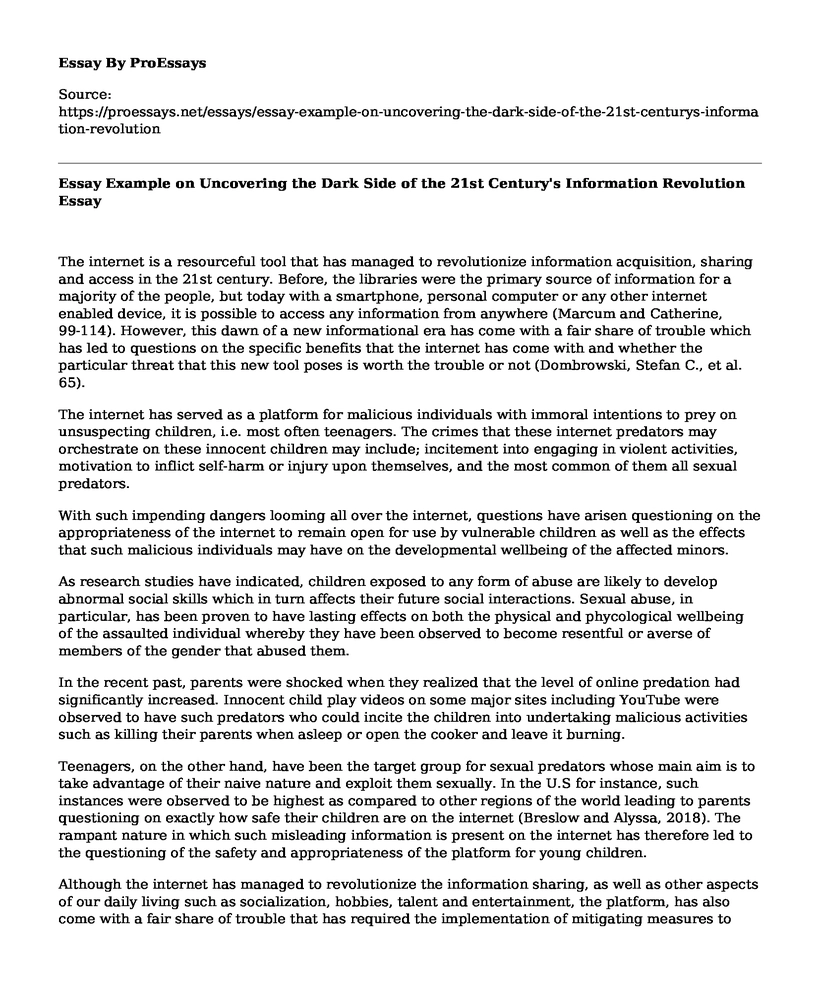The internet is a resourceful tool that has managed to revolutionize information acquisition, sharing and access in the 21st century. Before, the libraries were the primary source of information for a majority of the people, but today with a smartphone, personal computer or any other internet enabled device, it is possible to access any information from anywhere (Marcum and Catherine, 99-114). However, this dawn of a new informational era has come with a fair share of trouble which has led to questions on the specific benefits that the internet has come with and whether the particular threat that this new tool poses is worth the trouble or not (Dombrowski, Stefan C., et al. 65).
The internet has served as a platform for malicious individuals with immoral intentions to prey on unsuspecting children, i.e. most often teenagers. The crimes that these internet predators may orchestrate on these innocent children may include; incitement into engaging in violent activities, motivation to inflict self-harm or injury upon themselves, and the most common of them all sexual predators.
With such impending dangers looming all over the internet, questions have arisen questioning on the appropriateness of the internet to remain open for use by vulnerable children as well as the effects that such malicious individuals may have on the developmental wellbeing of the affected minors.
As research studies have indicated, children exposed to any form of abuse are likely to develop abnormal social skills which in turn affects their future social interactions. Sexual abuse, in particular, has been proven to have lasting effects on both the physical and phycological wellbeing of the assaulted individual whereby they have been observed to become resentful or averse of members of the gender that abused them.
In the recent past, parents were shocked when they realized that the level of online predation had significantly increased. Innocent child play videos on some major sites including YouTube were observed to have such predators who could incite the children into undertaking malicious activities such as killing their parents when asleep or open the cooker and leave it burning.
Teenagers, on the other hand, have been the target group for sexual predators whose main aim is to take advantage of their naive nature and exploit them sexually. In the U.S for instance, such instances were observed to be highest as compared to other regions of the world leading to parents questioning on exactly how safe their children are on the internet (Breslow and Alyssa, 2018). The rampant nature in which such misleading information is present on the internet has therefore led to the questioning of the safety and appropriateness of the platform for young children.
Although the internet has managed to revolutionize the information sharing, as well as other aspects of our daily living such as socialization, hobbies, talent and entertainment, the platform, has also come with a fair share of trouble that has required the implementation of mitigating measures to ensure children's safety online.
Among some of the measures that parents have taken includes the monitoring of their children online activities. However, this is not an efficient method given that there is the option to delete all these activities thereby leaving behind no evidence. Another measure that has proven effective includes the blocking of access to sites where children may be exposed to such content. Access of such sites may be restricted using parental control features that allow for such monitoring. Child safety on the online platform is a matter that ought to be prioritized given that the internet is only expected to be more integrated with our lives in the future and the least we could do is making it safer for safe navigation by our vulnerable children (Charles and Angela, 2017).
Works Cited
Dombrowski, Stefan C., et al. "Protecting children from online sexual predators: technological, psychoeducational, and legal considerations." Professional Psychology: Research and Practice 35.1 (2004): 65.
Marcum, Catherine D. "Interpreting the intentions of Internet predators: An examination of online predatory behavior." Journal of Child Sexual Abuse 16.4 (2007): 99-114.
Breslow, Alyssa. The Dangers of the Internet and the Sexual Exploitation of Children. Diss. Utica College, 2018.
Charles, Angela T. The Abuse of Teenagers by Online Predators Facilitated Through the Internet and Social Media. Diss. Utica College, 2017.
Cite this page
Essay Example on Uncovering the Dark Side of the 21st Century's Information Revolution. (2022, Dec 27). Retrieved from https://proessays.net/essays/essay-example-on-uncovering-the-dark-side-of-the-21st-centurys-information-revolution
If you are the original author of this essay and no longer wish to have it published on the ProEssays website, please click below to request its removal:
- E-Commerce Development in China
- The Story of an Icon: Michael Jackson Essay
- Essay Sample on US Policy in Afghanistan, Iran and Iraq
- Essay Sample on Ransomware and How to Protect Against It
- Yom Kippur War: US & USSR's Indirect Conflict Over Arab-Israel Battle - Essay Sample
- Essay Sample on William Sherman: Union Major General & Father of Total War
- Maximizing Teacher Resources - Free Report Sample







